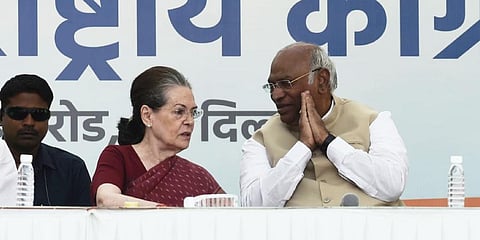

In the middle and upper circles of English-speaking India, Dr Shashi Tharoor represents a certain drawing-room level of comfort and aspiration. The same aspiration that motivates People Like Us living in Gated Communities to take the trouble of posting the snap of the cover of, say, Shehan Karunatilaka’s The Seven Moons of Maali Almeida and say kind things about the author and his Booker-winning novel without reading it. There seems to be a larger number of Indians on the job than Sri Lankans.
Similarly, when we associate ourselves with Tharoor, it is the comfort of the notion of civilities that the Western tradition of liberal democracy in general and the norms of engagement that the English language specifically represents that the Congress politician symbolises in his gesture and speech.
No language other than English can say with such ease, for example, ‘I am sorry, but you will be hanged.’ The English-speaking man or woman who says this is not sorry at all. Or he/she is sorry that things have come to this pass, but the specific hanging in question must proceed for the good of all. It is only a degree or two different from saying, ‘I am against Capital punishment, but in this atrocious case, I am for it, sorry.’ We don’t feel the physical experience that the words imply in any deep sense. Such freedom from pain is a debater’s delight. And who amongst us is secretly not one?
Dr Tharoor is the closest India has come to that decorum in public life. Naturally, Good People Like Us prefer to mentally associate with him rather than, say, Mallikarjun Kharge. We are all for Dalit leaders who do not speak Queen’s English, but, sorry, in this case, we make an exception. Because…Kharge seems so old-fashioned. And life is so much more.
We would like the Congress Party to be cast in the image of Dr Tharoor, and we imagine the proceedings that he might have presided over, not so unlike a drawing room discussion of a pleasant and mildly thought-provoking evening, where agreeing to disagree is the hallmark of the sophisticate.
A man like Kharge does not afford us these perhaps necessary Platonic dialogues. Glimpses into Utopia, even. Possibilities. In short, Kharge represents little beyond old-fashioned loyalist politics.
Tharoor gives us the illusion that there is more to politics than power: literature, perhaps. Life as a festival. He is London, the heart of Western civilisation, so sophisticated even a critique of their greatest achievements—co-terminus with colonisation—will be appreciated so long as a decorum informs the articulation. Because you see, a discussion could be an end in itself. Followed by a pithy joke. Coffee. Wine. Hugs. An invitation to a similar evening in the near future. A presence like Tharoor’s wakes in us the nostalgia for the good colonial times, and we consider ourselves lucky that Britain colonised us, not Rwanda, though Rwanda is doing pretty well these days, considering the Global Hunger Index: Rwanda ranks 102 out of 121 countries; India 107.
Since Kharge’s election as the president of the Congress party, the media, mostly yet run and written up by People Like Us, has sort of made out that Dr Tharoor’s loss is more triumphant than Kharge’s victory.
A leading newspaper from the south published a cartoon that showed Kharge with his hands missing, meaning he is not his own man and that he is a Sonia Gandhi stooge. Clearly, it is one of the aspirational traits that we hold loyalty as an inferior virtue to causes. We do not subscribe to E M Foster’s words: ‘If I had to choose between betraying my country and my friend, I hope I should have the guts to
betray my country.’
And it is in this rather safe preference for large abstractions rather than breathing and bloodied individuals a typical liberal (the good person) meets eye to eye with a typical right-winger.
This explains the spate of ridiculing cartoons and columns on Kharge since his victory. Another national newspaper, whose life breath is aspirational marketing, on its Sunday pages, headlined a column: ‘Kharge won’t cut it, so why not a shadow cabinet to revive Oppn’.
The columnist lists Congress leaders in a nostalgic cabinet of curiosities, most of them personalities who might have featured in the Manmohan Singh cabinets before 2014. Shashi Tharoor features in the shadow cabinet as minister for external affairs. Even his shadow is international and aspirational.
Kharge looks and acts like an Indian politician. Actually, a typical Congress politician. He is dark and ponderous, a Dravidian who may be happy at, say, Virat Kohli’s performance in the latest India (good) Vs Pak (evil) match but will not see it necessary to comment on the victory, because he sees cricket as extraneous to petrol price rise. He is no fun. People Like Us can’t have a drink with him. Which is why the Gandhis appreciate him. He is a loyalist, a Foster follower, even without reading the novelist. Just as all of us are Karunatilaka’s fans.
To prefer, as we do in our Gated Community culture, morning walks, IIC lunches, and campaigning for a seat on festival stages; to be seen and to be heard saying in some style, I am sorry, but you must be hanged; to have converted hard politics into a subject of dinner table talks, to sleep well, and then repeat all of it, we need a role model. That model is Tharoor. Except he does it with a natural élan. We can only aspire to be him. We do not aspire to be Kharge. We do not want to become Dalit. An anglophone phenomenon and a Nair-like Tharoor—are what we want to be.
We are a nation of Tharoor aspirants. And we wonder why the Gandhis settled for Kharge.
C P Surendran
Poet, novelist, and screenplay writer. His latest novel is One Love and the Many Lives of Osip B
(cpsurendran@gmail.com)